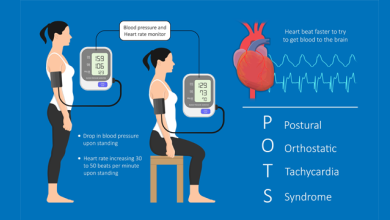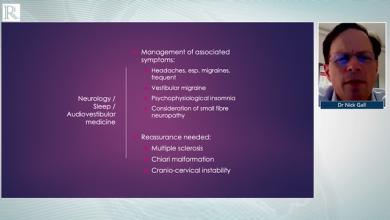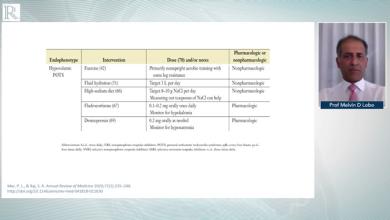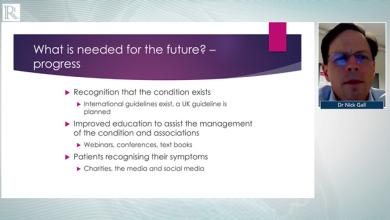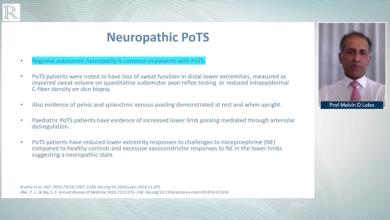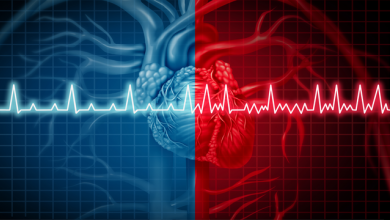Search results
Postural Tachycardia Syndrome (PoTS)
Video Series
Author(s):
Satish Raj
,
Robert Sheldon
Added:
3 years ago
Syncope and palpitations are two common clinical presentations, and both pose difficulties in the approach to their management. They are both symptoms of a number of syndromes, and an efficient approach with targeted therapy is challenging. Cardiac arrhythmia specialists, who lack a compact and accessible guide to management, see many patients with these symptoms in consultation. Recognising this…
View more
Author(s):
Rebecca S Steinberg
,
Weston Dicken
,
Alexis Cutchins
Added:
7 months ago
Author(s):
Andrew SP Sharp
,
Melvin D Lobo
,
Lesley Kavi
,
et al
Added:
3 years ago
In this six-part video panel discussion, Prof Andrew Sharp meets with an expert panel to moderate discussion on the issues surrounding Postural Tachycardia Syndrome (PoTS) which is an abnormality of the automatic nervous system (dysautonomia) that results in abnormal heart rate increases upon standing or sitting
Part three sees Dr Nick Gall (King's College, London, UK) discuss the co-morbidities…
View more
Author(s):
Andrew SP Sharp
,
Melvin D Lobo
,
Lesley Kavi
,
et al
Added:
3 years ago
In this six-part video panel discussion, Prof Andrew Sharp meets with an expert panel to moderate discussion on the issues surrounding Postural Tachycardia Syndrome (PoTS) which is an abnormality of the automatic nervous system (dysautonomia) that results in abnormal heart rate increases upon standing or sitting.
Part five sees Prof Melvin Lobo (Bart's BP Centre of Excellence, UK) discuss drug…
View more
Author(s):
Andrew SP Sharp
,
Melvin D Lobo
,
Lesley Kavi
,
et al
Added:
3 years ago
In this six-part video panel discussion, Prof Andrew Sharp meets with an expert panel to moderate discussion on the issues surrounding Postural Tachycardia Syndrome (PoTS) which is an abnormality of the automatic nervous system (dysautonomia) that results in abnormal heart rate increases upon standing or sitting.
Part four sees Prof Lesley Kavi (Birmingham City University, UK) discuss the non…
View more
Author(s):
Andrew SP Sharp
,
Melvin D Lobo
,
Lesley Kavi
,
et al
Added:
3 years ago
This video is part of a six-part video panel discussion, Prof Andrew Sharp meets with an expert panel to moderate discussion on the issues surrounding Postural Tachycardia Syndrome (PoTS) which is an abnormality of the automatic nervous system (dysautonomia) that results in abnormal heart rate increases upon standing or sitting.
Part one sees Prof Lesley Kavi (Birmingham City University,…
View more
Author(s):
Andrew SP Sharp
,
Melvin D Lobo
,
Nick Gall
,
et al
Added:
3 years ago
In this six-part video panel discussion, Prof Andrew Sharp meets with an expert panel to moderate discussion on the issues surrounding Postural Tachycardia Syndrome (PoTS) which is an abnormality of the automatic nervous system (dysautonomia) that results in abnormal heart rate increases upon standing or sitting.
The concluding video sees Dr Gall (King's College, UK) discuss what the future…
View more
Author(s):
Andrew SP Sharp
,
Melvin D Lobo
,
Lesley Kavi
,
et al
Added:
3 years ago
In this six-part video panel discussion, Prof Andrew Sharp meets with an expert panel to moderate discussion on the issues surrounding Postural Tachycardia Syndrome (PoTS) which is an abnormality of the automatic nervous system (dysautonomia) that results in abnormal heart rate increases upon standing or sitting.
Part two sees Prof Melvin Lobo (Barts BP Centre of Excellence, UK) discuss the…
View more
Author(s):
Mahmoud Abdelnabi
,
Ashraf Ahmed
,
Abdallah Almaghraby
,
et al
Added:
3 years ago
Ivabradine is a pure heart rate-lowering agent best characterised by its negative chronotropic effect on the sinoatrial node.1 Its unique mechanism selectively blocks the pacemaker funny (If) channels, which are responsible for spontaneous depolarisation in the sinoatrial node that regulates heart rate during sinus rhythm (Figure 1).2 Since 1980, it has been well established that controlling the…
View more








